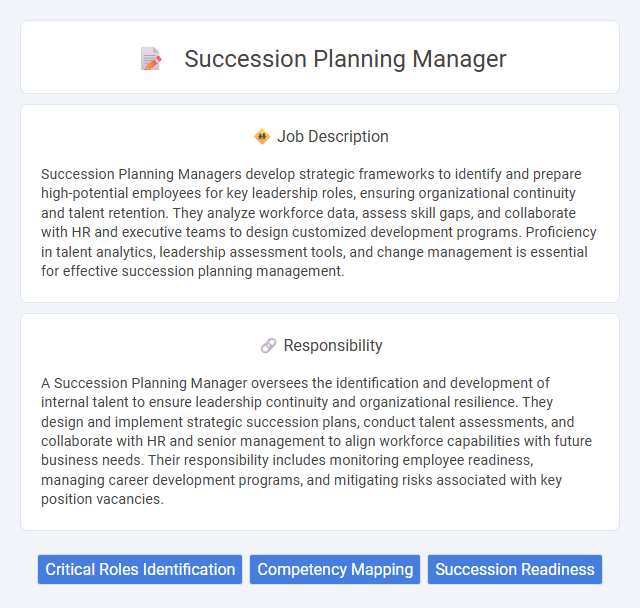
Succession Planning Managers develop strategic frameworks to identify and prepare high-potential employees for key leadership roles, ensuring organizational continuity and talent retention. They analyze workforce data, assess skill gaps, and collaborate with HR and executive teams to design customized development programs. Proficiency in talent analytics, leadership assessment tools, and change management is essential for effective succession planning management.
Individuals with strong analytical skills and a keen understanding of organizational dynamics are likely to be suitable for a Succession Planning Manager role. Those who excel in strategic thinking and possess excellent communication abilities may have a higher probability of effectively managing talent pipelines and leadership development. Candidates lacking adaptability or the ability to navigate complex interpersonal relationships might face challenges in fulfilling the responsibilities of this position.
Qualification
A Succession Planning Manager should possess a strong background in human resources, organizational development, or business management, often requiring a bachelor's or master's degree in these fields. Key qualifications include expertise in talent management, data analysis, and succession planning software, alongside excellent strategic thinking and leadership skills. Proven experience in developing leadership pipelines and aligning succession strategies with organizational goals is essential for driving effective workforce continuity.
Responsibility
A Succession Planning Manager oversees the identification and development of internal talent to ensure leadership continuity and organizational resilience. They design and implement strategic succession plans, conduct talent assessments, and collaborate with HR and senior management to align workforce capabilities with future business needs. Their responsibility includes monitoring employee readiness, managing career development programs, and mitigating risks associated with key position vacancies.
Benefit
Succession Planning Managers likely enhance organizational resilience by identifying and developing future leaders, reducing the risk of leadership gaps. Their role probably improves employee retention and motivation through clear career progression pathways. Effective succession planning may result in smoother transitions during turnover, supporting sustained business performance.
Challenge
The role of a Succession Planning Manager likely involves navigating challenges related to identifying and developing high-potential talent within an organization. There is a probability of facing difficulties in aligning succession strategies with long-term business goals while managing diverse workforce demographics. Overcoming resistance to change and ensuring accurate talent assessments may pose ongoing obstacles in this position.
Career Advancement
Succession Planning Managers play a crucial role in identifying and developing future leaders to ensure organizational continuity and growth. Expertise in talent assessment, leadership development, and strategic workforce planning directly contributes to career advancement opportunities within human resources and executive leadership roles. Mastery of succession frameworks and data-driven decision-making can accelerate progression to senior management or chief human resources officer positions.
Key Terms
Critical Roles Identification
Succession Planning Managers specialize in identifying critical roles within an organization to ensure seamless leadership transitions and maintain business continuity. They analyze workforce data and organizational structure to pinpoint positions that significantly impact company performance and require robust talent pipelines. Effective critical roles identification helps minimize risks associated with unexpected vacancies and supports strategic human capital development.
Competency Mapping
A Succession Planning Manager specializing in competency mapping identifies critical skills and behaviors required for key leadership roles, ensuring alignment with organizational goals. They develop competency frameworks that assess employee potential and readiness, facilitating targeted development programs and seamless leadership transitions. Mastery in competency analytics and talent assessment tools enhances strategic workforce planning and mitigates leadership gaps effectively.
Succession Readiness
A Succession Planning Manager ensures organizational continuity by identifying and developing high-potential talent to maintain leadership pipelines and minimize critical role vacancies. They assess succession readiness through competency evaluations, talent gap analysis, and targeted development plans to prepare candidates for future leadership positions. Leveraging data-driven strategies, the manager enhances workforce agility and supports long-term business sustainability.
 kuljobs.com
kuljobs.com